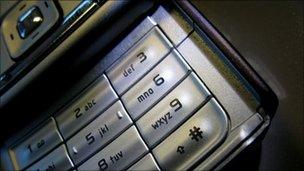Sunday Mirror phone-hacking claim revealed by Newsnight
- Published

A source told Newsnight that Sunday Mirror reporters used phone hacking to get scoops
Evidence of possible phone hacking at the Sunday Mirror newspaper has been found by the BBC's Newsnight.
The programme spoke to a journalist who worked on the paper in the past decade who claimed to have witnessed routine phone hacking in the newsroom.
The source said celebrities including actress Liz Hurley and footballer Rio Ferdinand were targeted.
Trinity Mirror said its journalists work within the criminal law and Press Complaints Commission code of conduct.
Also it has emerged that Lord Leveson, the judge who will lead the hacking inquiry has said he had attended functions with Rupert Murdoch's son-in-law - but that he had informed Prime Minister David Cameron of this before the appointment was announced.
'Dark arts'
The allegations about the Sunday Mirror were detailed by a source who told Newsnight: "One afternoon in the newsroom I saw Liz Hurley's phone being hacked and a reporter listen to her mobile phone messages and take a note of what was said.
"It was a Thursday and I was told that there wasn't much on there - just something about lunch from another woman, so they would keep trying before the weekend to see what they could find."
The programme's source said the technique of phone hacking was used on a daily basis.
"Designated reporters would be doing it pretty much every day," they said.
"One reporter who was very good at it was called the 'master of the dark arts'.
Voiceover artist
"At one point in 2004 it seemed like it was the only way people were getting scoops.
"If they didn't just randomly hack people in the news, they would use it to stand up stories that people had denied."
The source claimed the Sunday Mirror hired a voiceover artist to imitate famous people in order to get information about them.
"I was told he had successfully managed to get health records too," the source said.
"He was such a god of a voiceover artist that he could pretend to be famous people or failing that he'd pretend to be their lawyer or someone related to them.
"I was told that we had got [actress] Leslie Ash's medical records from the 'dark arts'."
'Followed extensively'
Meanwhile, BBC home affairs correspondent Tom Symonds said a former Daily Mirror journalist James Hipwell has told an Australian newspaper he is willing to testify that in the late 1990s Mirror journalists were told to go through the voicemails of celebrities to look for stories.
Hipwell has served time in prison for writing about companies whose shares he owned.
Trinity Mirror Group said in a statement: "Trinity Mirror's position is clear. Our journalists work within the criminal law and the Press Complaints Commission code of conduct."
The BBC has also learned that the News of the World hired a private investigator to follow Labour MP Tom Watson while he attended his party's conference in Brighton in 2009.
A source close to the now defunct Sunday tabloid said the paper was attempting to write a story about the MP but nothing was published.
There is no suggestion that Mr Watson's mobile phone was hacked.
"Politicians were being followed extensively," said the source who worked for the newspaper for several years but asked not to be named.
News International, which published the News of the World, said it would not comment.
Family connection
Meanwhile, the BBC's Robin Brant said that Lord Leveson had made the disclosure about his connection to the Murdoch family to both David Cameron and the Lord Chief Justice Lord Judge, before he was chosen last week as the man to lead the judicial inquiry into phone hacking.
The senior judge met with Matthew Freud, who is married to Rupert Murdoch's daughter Elisabeth, at functions while he was chairman of the sentencing council, which advises the government on sentencing policy.
Downing Street said Lord Leveson attended the events organised by Mr Freud in his capacity as sentencing council chair, and "nothing more".